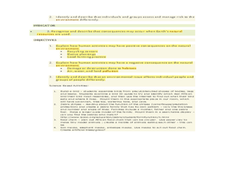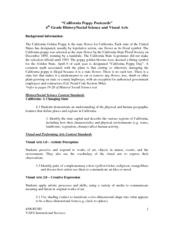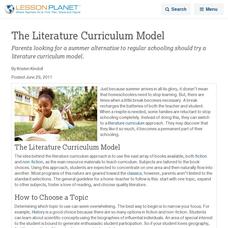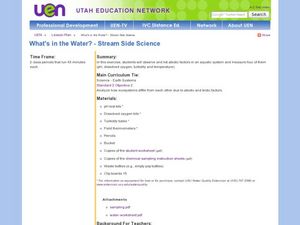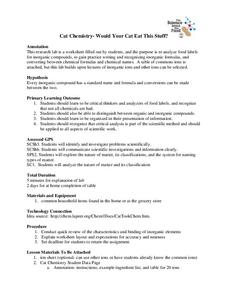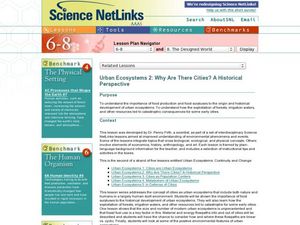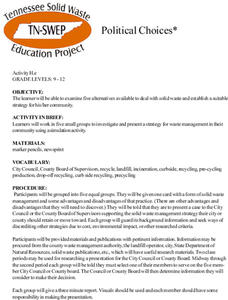Curated OER
Exploring Arizona's Biotic Communities Lesson 2: Biotic Communities Vocabulary
Part of a unit on Arizona's biotic communities, this lesson focuses on the vocabulary to be used. Terms include biodiversity, topography, desert, hybridization, niche, and more! Youngsters will define these words from contextual...
Curated OER
African Ecology and Art
Explore Samburu culture as students examine art work by many artists and compare and contrast their styles. They view Kenyan images and find Kenya on the map. Students identify conflict in the animal world and draw animals and record in...
Curated OER
Two-Digit Subtraction With and Without Regrouping
Second graders subtract two-digit numbers. In this mathematics lesson, 2nd graders subtract both with and without regrouping. Students use manipulatives and place value mats to assist in problem solving.
Curated OER
Genes within Populations
Finally, here is a genetics worksheet that does not include Punnett squares! Designed for a more advanced class, biology learners will compare Lamarck's concept of evolution with Darwin's. They will explore the Hardy-Weinberg equilibrium...
Curated OER
California Poppy Postcards
What a great lesson plan! Learners discuss California history, including the state flower, the poppy, and then engage in an art activity. For the activity, they learn about value, shading, layering, blending etc. to produce a realistic...
Curated OER
The Literature Curriculum Model
Parents looking for a summer alternative to regular schooling, should try a literature curriculum model.
Curated OER
What's in the Water? - Stream Side Science
Here is a complete activity in which young biologists or ecologists test the pH, dissolved oxygen, turbidity and temperature of stream water. The class visits an actual stream and makes observations of the site. They use scientific...
Curated OER
Wetland vs. Stream Macroinvertebrates
A link to a comprehensive macroinvertebrate guide gives you the information needed to prepare for this field study activity. Sample macroinvertebrates are collected from areas representing different environmental conditions. Junior...
ARKive
Adaptations to Arid Habitats
How do plants and animals survive in habitats with very little water? Explore arid ecosystems and the way their inhabitants have adapted with a instructional activity and science experiment. After kids listen to a presentation about...
PBS
Heart to Heart
Study heart health and math in one activity. After measuring their resting heart rates by finding the pulse in their wrists, learners build a stethoscope to listen to their heart rate, and note the differences between the two methods.
Agriculture in the Classroom
A Rafter of Turkeys
How did that turkey get from the early Aztec culture to your table? Learn about the history of wild and domesticated turkeys in North America, as well as their inclusion in Thanksgiving traditions, with a two-part agricultural science...
Curated OER
Viewing Bacteria
Have you ever wanted to know the true structure of E.coli? Does the thought of peering into its "small world" sound exciting? Here is a lesson that allows pupils the ability to do just that. Blossoming microbiologists use...
University of Georgia
Would Your Cat Eat This Stuff?
Processed foods use inorganic compounds for flavoring and preservation. This take-home laboratory challenges scholars to find 20 different compounds identified on the labels of foods to list on their data collection sheet. The activity...
Howard Hughes Medical Institute
Gorongosa: Scientific Inquiry and Data Analysis
How does the scientific process begin? Introduce ecology scholars to scientific inquiry through an insightful, data-driven lesson. Partners examine data from an ongoing research study to determine the questions it answers. The resource...
Digital Writing and Research Lab's – Lesson Plans
Teaching Close Reading through Short Composition/Revision
This activity may have writers evaluate short compositions, but their subjects are quite tall: great Americans. Pupils read one another's compositions and closely examine how specific phrases and diction contribute to shaping American...
Tidewater Community College
Assignment: The “Big Mac” Index
Young economists learn about the method of predicting changes in the exchange rate with Big Macs in an instructional video. After an understanding the index, learners write a post on a discussion board and respond to class members' posts...
Curated OER
Should Art Be for Art's Sake?
High schoolers examine how European-America aestheticians (philosophers of art) do not all agree about the value and definition of art. students examine how some cultures do not have a distinct word or definition for art.
Curated OER
Urban Ecosystems 2: Why Are There Cities? A Historical Perspective
Young scholars investigate the importance of food surpluses to the historical development of urban ecosystems.
Curated OER
The Mekong River
Junior geographers explore the region through which the Mekong flows, its pathway, the landscape, how people depend on the Mekong, and future uncertainties. They apply the five themes of geography to examine the region. They create a...
Curated OER
Presidential Election Year: Major Issues
Whether or not it's a presidential election year, this debate activity will spark research on current political issues. Split your government scholars into 4 groups and assign each a political party. One person will be the "candidate"...
Curated OER
CO2 and You
Students study the scientific evidence about carbon dioxide emissions. They learn to calculate the amount of energy used by different appliances. They complete a worksheet which analyzes the amount of energy that their home uses.
Curated OER
Political Choices
Students, in small groups, investigate and present a strategy for waste management in their community using a simulation activity in which each group represents a sector of their community.
Curated OER
Planet Impact!
An amazing information-packed lesson plan allows your space scientists to crash a virtual comet into Jupiter and learn how the angle, distance, speed, and mass influence the outcome. Click on "Back to the Lesson" to access the...
Curated OER
Wetland Metaphors
Students describe the characteristics of wetlands and identify their ecological functions. They inspect items and use them to create metaphors about wetlands.
Other popular searches
- Natural Selection Foldable
- Darwin Natural Selection
- Natural Selection Beans
- Natural Selection Game
- Natural Selection Beak
- Natural Selection Evolution
- Evolution, Natural Selection
- Biology Natural Selection
- Natural Selection Ancestor
- Natural Selection Fold Able
- Natural Selection Behavior
- Natural Selection Phenotypes



